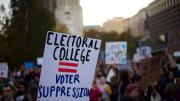As a social entrepreneur, Be The Change CEO Kevin Jennings ’85 has sometimes found government service frustrating. Why? Because he’s used to “having an idea and getting it done, not having 47 meetings about the idea.”
Jennings was among those who talked about his experiences and doled out advice to undergraduates during this January’s Wintersession series on service and political careers, organized by the Kennedy School’s Institute of Politics. Between 1,500 and 3,000 undergraduates participated in the “J-term” activities, which ranged from career-networking clinics, writing workshops, and sessions on how to do qualitative research or found a start-up to a variety of classes on topics that included food and wine, yoga, filmmaking, sculpture, and dance. Jennings was one of more than a hundred alumni who engaged with the 500-plus undergraduates participating in programs run by the Harvard Alumni Association, extending from public service to book talks by notable authors.
A former high-school history teacher and founder of GLSEN (the Gay, Lesbian, and Straight Education Network), Jennings also recently served as assistant deputy secretary in the U.S. Department of Education and head of its Office for Safe and Drug-Free Schools. Be The Change, which he joined last year, creates national issue-based campaigns; it is currently focused on public service—it played an active role in the 2009 enactment of the Edward M. Kennedy Serve America Act—and its Opportunity Nation effort, which seeks to “promote opportunity, social mobility, and access to the American Dream.”
Jennings told students not to worry about choosing between direct, hands-on service and policy advocacy: “They are not mutually exclusive: do both!” But he urged his audience to consider their skills, strengths, and expectations realistically in terms of effecting change over time. Those who want to make an immediate, tangible impact on individuals should not become the head of a nonprofit, a policymaker, or an elected official, he counseled. Laws such as the Americans with Disabilities Act take decades to pass. “People who start a nonprofit with a cause they care about get frustrated because they’re not delving into the services themselves,” Jennings said. “If you want to do the work itself, then become the director of programming, or some title other than CEO.” It may not be as public or glamorous, but it will be more fulfilling, he added. “If you’re not doing something you find truly rewarding, you’re not going to like it—and you’re not going to be very helpful,” he explained. “I had to go into public service because it was the only thing that kept me interested all day long.”
Recognize what service jobs actually entail, he warned. Elected officials and CEOs of nonprofits, for example, “are consumed with fundraising; they spend three to four hours a day on the phone, talking to raise money.” And be prepared for the hard work ahead. When Jennings was head of GLSEN, he said, one of his board members told him, “Kevin, you’re fun and charismatic and smart—but you don’t know how to run anything.” That prompted Jennings to return to school for an M.B.A., and now he urges “anyone who wants to get things done in the public sector to consider getting one, too.” Why? As Jennings put it bluntly: “We think because we’re right, we’ll win.…But being right only gets you so far.”







